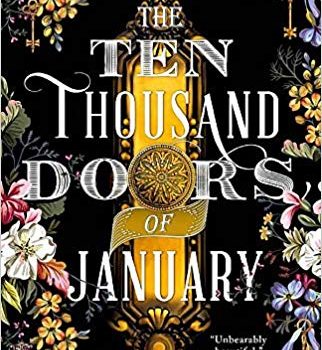Gary K. Wolfe Reviews The Ten Thousand Doors of January by Alix E. Harrow
 The Ten Thousand Doors of January, Alix E. Harrow (Redhook 978-0-316-42199-7, $27.00, 384pp, hc) September 2019.
The Ten Thousand Doors of January, Alix E. Harrow (Redhook 978-0-316-42199-7, $27.00, 384pp, hc) September 2019.
The idea of locking out historical change in order to preserve a particular version of male hegemony is an important theme in Alix E. Harrow’s remarkable first novel, The Ten Thousand Doors of January, but for me to explain further might compromise some of the readerly pleasures of unfolding Harrow’s multilayered, origami-like narrative. Essentially, Harrow combines the conventions of portal fantasy with a version of parallel-worlds SF, but both are subsumed to her main concern, which is the liberating potential of words and stories. The ten thousand doors of the title are actual portals to other realities, scattered all over the globe, one of which is discovered by the main narrator, January Scaller, when she is just seven years old. January is a mixed-race girl being raised on the luxurious Vermont estate of the wealthy William Cornelius Locke, an early 20th-century robber baron in the mold of J.P. Morgan or William Randolph Hearst. Like Hearst he dispatches employees all over the world to bring back archeological treasures for his own vast, private museum. January’s father is one of these employees. The reason for Locke’s uncharacteristic generosity in raising (or at least hiring nannies for) January, who only sees her father on his rare trips back to the US, doesn’t become apparent until much later in the tale. January’s own ingratiating autobiographical narrative, spanning decades, forms the spine of the novel.
Along the way, we get an intriguing assortment of nested tales with different narrators. An inveterate reader (her favorites include Tom Swift), January discovers a damaged leather-bound book called The Ten Thousand Doors, an academic study of portals in mythology by “Yule Ian Scholar” of the City of Nin in one of those parallel worlds. The chapters of this book, alternating with January’s own narrative, tell of the early life of Adelaide Larson, born in Kentucky in 1866, who after a childhood encounter with a “ghost boy” sets out to find her own portals. Then the book-within-the-book shifts into an account of Yule’s own childhood in Nin and his struggles as a scholar of alternate worlds (complete with footnotes, which slyly allude to some of Harrow’s own literary ancestors, such as an English children’s writer named Edith Bland – the married name of E. Nesbit). Before the novel is out, we’ll also get stories told by Jane, a mysterious but resourceful African woman who turns out to be January’s only real ally among her various caretakers, and even by Locke himself, explaining his involvement with the rather shadowy New England Archeological Society of which he is a founder. Sometimes these voices aren’t quite as differentiated as they might be – at times Yule sounds a lot like January herself – but watching these various tales click into place in the context of January’s own increasingly perilous adventures – which eventually involve battling various vampires and assassins with the aid of a loyal dog and an infatuated neighbor boy – is one of the chief delights of the novel, as is January’s growing awareness of her own power as a “wordworker.”
As grim and Dickensian as it sometimes gets, Harrow clearly means her tale to be a joyous celebration of the magic of words and stories, and her enthusiasm is undeniably infectious. At one point, Yule describes a world which he calls Written, in which “words themselves have power.”
I do not mean they have power in the sense that they might stir men’s hearts or tell stories or declare truths, for those are the powers words have in every world. I mean that words in that world can sometimes rise from their ink-and-cotton cradles and reshape the nature of reality. Sentences may alter the weather, and poems might tear down walls. Stories may change the world.
There’s little doubt that the world Yule is describing here is also the world of The Ten Thousand Doors of January, or the world that the novel, like all classic fantasies, seeks to make our own. Whether or not Harrow’s novel survives to join that company is anyone’s guess, but it’s a beautiful beginning, and unlike any other fantasy I’ve read in some years.
Gary K. Wolfe is Emeritus Professor of Humanities at Roosevelt University and a reviewer for Locus magazine since 1991. His reviews have been collected in Soundings (BSFA Award 2006; Hugo nominee), Bearings (Hugo nominee 2011), and Sightings (2011), and his Evaporating Genres: Essays on Fantastic Literature (Wesleyan) received the Locus Award in 2012. Earlier books include The Known and the Unknown: The Iconography of Science Fiction (Eaton Award, 1981), Harlan Ellison: The Edge of Forever (with Ellen Weil, 2002), and David Lindsay (1982). For the Library of America, he edited American Science Fiction: Nine Classic Novels of the 1950s in 2012, with a similar set for the 1960s forthcoming. He has received the Pilgrim Award from the Science Fiction Research Association, the Distinguished Scholarship Award from the International Association for the Fantastic in the Arts, and a Special World Fantasy Award for criticism. His 24-lecture series How Great Science Fiction Works appeared from The Great Courses in 2016. He has received six Hugo nominations, two for his reviews collections and four for The Coode Street Podcast, which he has co-hosted with Jonathan Strahan for more than 300 episodes. He lives in Chicago.
This review and more like it in the September 2019 issue of Locus.
 While you are here, please take a moment to support Locus with a one-time or recurring donation. We rely on reader donations to keep the magazine and site going, and would like to keep the site paywall free, but WE NEED YOUR FINANCIAL SUPPORT to continue quality coverage of the science fiction and fantasy field.
While you are here, please take a moment to support Locus with a one-time or recurring donation. We rely on reader donations to keep the magazine and site going, and would like to keep the site paywall free, but WE NEED YOUR FINANCIAL SUPPORT to continue quality coverage of the science fiction and fantasy field.









I enjoyed it. There are a few historical details that are wrong; you couldn’t take a train from British East Africa to Khartoum — and still can’t, for that matter. You could travel that way but you were on foot or riverboat most of it; Teddy Roosevelt did it that way, but he had a very well-equipped safari and it was still pretty grueling. And there’s a tendency to “noble-savageism”, but it’s not the first or last book to suffer from that. Basically very well-written and some fine lyrical passages.
If your character is set in the 1800’s then the mores and sensibilities of the time period make sense. Historical fantasy fiction works better with authentic time-periods details blended with imagination.